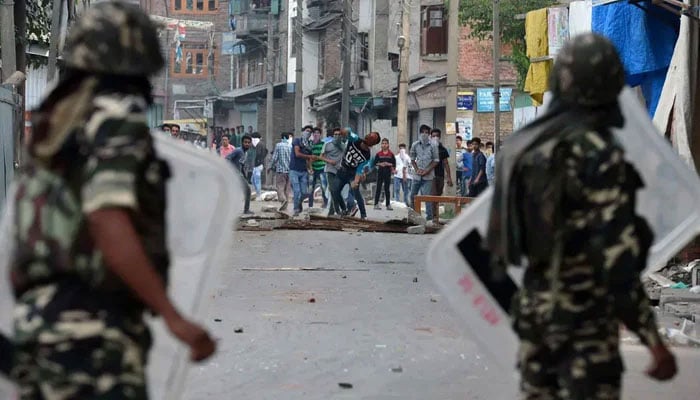Occupied polls
Experts have pointed out that fact that BJP is holding elections in IIOJK is tacit admission that Modi’s policy has failed
The three-phased provincial elections in Indian Illegally Occupied Jammu and Kashmir (IIOJK) began yesterday, marking the first local elections since August 2019 when the Modi government scrapped Article 370, which had granted IIOJK a certain degree of autonomy. These elections are also the first in a decade. While the Indian Supreme Court has upheld the decision to remove Occupied Kashmir’s special status, this election raises an important question: what real impact will these elections have on the lives of Kashmiris in the occupied region? The contest is between regional parties that promise to restore the special status, India’s Congress party pledging full statehood if elected, and the ruling BJP, which promises development and a permanent end to violence. But this electoral contest offers little hope for substantive change. The legislative assembly that will be elected cannot restore the special status; it is merely a symbolic exercise. Real power remains with the Indian government, and without the ability to reverse the abrogation of Article 370, Kashmiris will continue to suffer under Indian occupation.
Experts have pointed out that the very fact that the BJP is holding assembly elections in IIOJK is a tacit admission that Modi’s Kashmir policy has been a failure. The revocation of Kashmir’s special status in 2019 was not merely an administrative move. It was a calculated political decision aimed at suppressing the Muslim-majority population in the region and opening up the territory for demographic changes. The Modi government has encouraged people from the rest of India to acquire property and settle permanently in Occupied Kashmir, an effort to alter the region’s demographic balance to suit the BJP’s Hindutva ideology. Since the removal of Article 370, Occupied Kashmir has witnessed a near-total clampdown on civil liberties. Journalists, human rights defenders, and politicians have been arbitrarily arrested, and the region has been subjected to an information blackout. The international community has been largely silent, prioritizing economic and geopolitical ties with India over human rights concerns.
As these elections take place, there is scepticism over whether they will bring any relief to the Kashmiri people. Some say that one of the reasons Kashmiris want these polls to take place is because ‘something is better than nothing’. But it is difficult to see how these elections, held under the shadow of military occupation, can lead to meaningful change. They are more of a facade designed to legitimize the Modi government’s illegal actions in Kashmir, rather than a genuine attempt to restore democracy. The brutality with which successive Indian governments, especially the Modi junta, have ruled over Occupied Kashmir shows that human rights and democracy do not really matter to India despite being the world’s largest democracy. It is time for the international community to hold India accountable for its actions and stand with the people of Kashmir, who have endured decades of brutal occupation.
-
 Andy Cohen Gets Emotional As He Addresses Mary Cosby's Devastating Personal Loss
Andy Cohen Gets Emotional As He Addresses Mary Cosby's Devastating Personal Loss -
 Andrew Feeling 'betrayed' By King Charles, Delivers Stark Warning
Andrew Feeling 'betrayed' By King Charles, Delivers Stark Warning -
 Andrew Mountbatten's Accuser Comes Up As Hillary Clinton Asked About Daughter's Wedding
Andrew Mountbatten's Accuser Comes Up As Hillary Clinton Asked About Daughter's Wedding -
 US Military Accidentally Shoots Down Border Protection Drone With High-energy Laser Near Mexico Border
US Military Accidentally Shoots Down Border Protection Drone With High-energy Laser Near Mexico Border -
 'Bridgerton' Season 4 Lead Yerin Ha Details Painful Skin Condition From Filming Steamy Scene
'Bridgerton' Season 4 Lead Yerin Ha Details Painful Skin Condition From Filming Steamy Scene -
 Matt Zukowski Reveals What He's Looking For In Life Partner After Divorce
Matt Zukowski Reveals What He's Looking For In Life Partner After Divorce -
 Savannah Guthrie All Set To Make 'bravest Move Of All'
Savannah Guthrie All Set To Make 'bravest Move Of All' -
 Meghan Markle, Prince Harry Share Details Of Their Meeting With Royals
Meghan Markle, Prince Harry Share Details Of Their Meeting With Royals -
 Hillary Clinton's Photo With Jeffrey Epstein, Jay-Z And Diddy Fact-checked
Hillary Clinton's Photo With Jeffrey Epstein, Jay-Z And Diddy Fact-checked -
 Netflix, Paramount Shares Surge Following Resolution Of Warner Bros Bidding War
Netflix, Paramount Shares Surge Following Resolution Of Warner Bros Bidding War -
 Bling Empire's Most Beloved Couple Parts Ways Months After Announcing Engagement
Bling Empire's Most Beloved Couple Parts Ways Months After Announcing Engagement -
 China-Canada Trade Breakthrough: Beijing Eases Agriculture Tariffs After Mark Carney Visit
China-Canada Trade Breakthrough: Beijing Eases Agriculture Tariffs After Mark Carney Visit -
 Police Arrest A Man Outside Nancy Guthrie’s Residence As New Terrifying Video Emerges
Police Arrest A Man Outside Nancy Guthrie’s Residence As New Terrifying Video Emerges -
 London To Host OpenAI’s Biggest International AI Research Hub
London To Host OpenAI’s Biggest International AI Research Hub -
 Elon Musk Slams Anthropic As ‘hater Of Western Civilization’ Over Pentagon AI Military Snub
Elon Musk Slams Anthropic As ‘hater Of Western Civilization’ Over Pentagon AI Military Snub -
 Walmart Chief Warns US Risks Falling Behind China In AI Training
Walmart Chief Warns US Risks Falling Behind China In AI Training




